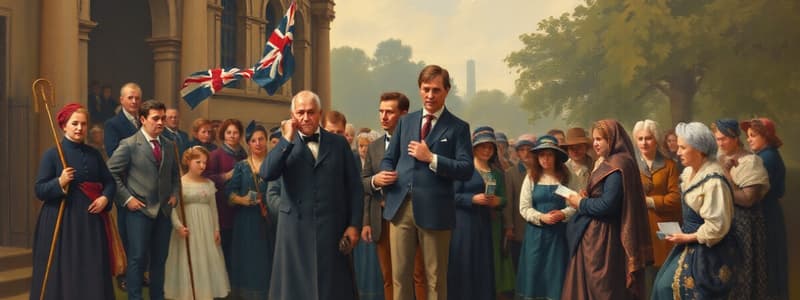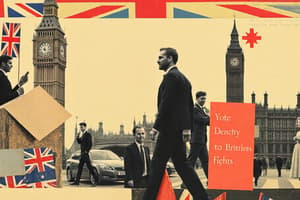Podcast
Questions and Answers
What was the primary reason for the British Parliament's passage of the Reform Bill of 1832?
What was the primary reason for the British Parliament's passage of the Reform Bill of 1832?
Which of the following groups primarily benefited from the Reform Bill of 1832?
Which of the following groups primarily benefited from the Reform Bill of 1832?
Which of the following events directly influenced the British Parliament's decision to pass the Reform Bill of 1832?
Which of the following events directly influenced the British Parliament's decision to pass the Reform Bill of 1832?
What significant change did the Reform Bill of 1832 introduce to the British electoral system?
What significant change did the Reform Bill of 1832 introduce to the British electoral system?
Signup and view all the answers
Prior to the Reform Bill of 1832, what group held the most power in the British government?
Prior to the Reform Bill of 1832, what group held the most power in the British government?
Signup and view all the answers
Why was voting restricted to men who owned a substantial amount of land in Britain before 1832?
Why was voting restricted to men who owned a substantial amount of land in Britain before 1832?
Signup and view all the answers
What was the impact of the Reform Bill of 1832 on the British political system?
What was the impact of the Reform Bill of 1832 on the British political system?
Signup and view all the answers
Why was the Reform Bill of 1832 considered a significant step towards democracy in Britain?
Why was the Reform Bill of 1832 considered a significant step towards democracy in Britain?
Signup and view all the answers
What event in France prompted the British government to address calls for reform?
What event in France prompted the British government to address calls for reform?
Signup and view all the answers
What was the main characteristic of the British political system before the Reform Bill of 1832?
What was the main characteristic of the British political system before the Reform Bill of 1832?
Signup and view all the answers
What were the key factors driving the demand for democratic reforms in Britain and France during the 19th century?
What were the key factors driving the demand for democratic reforms in Britain and France during the 19th century?
Signup and view all the answers
The text states that Britain transitioned to a constitutional monarchy in the late 1600s. What was the main consequence of this transition for the government structure?
The text states that Britain transitioned to a constitutional monarchy in the late 1600s. What was the main consequence of this transition for the government structure?
Signup and view all the answers
Which of the following statements accurately reflects the nature of democratic reforms during the 19th century in Britain and France?
Which of the following statements accurately reflects the nature of democratic reforms during the 19th century in Britain and France?
Signup and view all the answers
The text mentions that urbanization and industrialization brought sweeping changes to Western nations. What was the primary impact of these changes on the political landscape?
The text mentions that urbanization and industrialization brought sweeping changes to Western nations. What was the primary impact of these changes on the political landscape?
Signup and view all the answers
The passage states that the movement aimed to improve conditions for workers and the poor. Which of the following demands would this movement likely have advocated for?
The passage states that the movement aimed to improve conditions for workers and the poor. Which of the following demands would this movement likely have advocated for?
Signup and view all the answers
According to the passage, what was the central argument of groups advocating for the expansion of suffrage?
According to the passage, what was the central argument of groups advocating for the expansion of suffrage?
Signup and view all the answers
Based on the passage, what was the primary reason for the growing demand for political reforms?
Based on the passage, what was the primary reason for the growing demand for political reforms?
Signup and view all the answers
The passage mentions that the movement aimed to achieve specific goals. Which of the following best reflects the central aim of this movement?
The passage mentions that the movement aimed to achieve specific goals. Which of the following best reflects the central aim of this movement?
Signup and view all the answers
The text states that Britain became a constitutional monarchy. Which of the following is NOT a key characteristic of a constitutional monarchy?
The text states that Britain became a constitutional monarchy. Which of the following is NOT a key characteristic of a constitutional monarchy?
Signup and view all the answers
The passage highlights the impact of urbanization and industrialization on the demand for democratic reforms. How did these changes contribute to the growing calls for reforms?
The passage highlights the impact of urbanization and industrialization on the demand for democratic reforms. How did these changes contribute to the growing calls for reforms?
Signup and view all the answers
Study Notes
Democratic Reform and Activism
- Urbanization and industrialization led to widespread demands for change, particularly for better living and working conditions.
- People sought greater political representation.
- Various groups, including the middle class, workers, and women, advocated for extending voting rights.
British Reforms
- Britain's government, a constitutional monarchy, evolved beyond the limited electorate of the early 1800s.
- The House of Commons members were elected by the people.
- The Reform Bill of 1832 expanded voting rights to include the middle class, easing property requirements for voting.
- Reform Bill of 1832 modernized electoral districts, increasing representation from growing cities.
- Reform efforts continued; the right to vote eventually extended to more men, including working-class men in the late 1800s, and then to women.
- The Chartist movement advocated for further reforms, including universal male suffrage, secret ballots, and salaries for members of Parliament.
The Rise of Zionism
- Persecution of Jews increased in Eastern Europe, resulting in significant emigration.
- Zionism movement advocated for the establishment of a Jewish homeland.
- Theodor Herzl was a key figure in the Zionist movement.
Women's Suffrage
- Increased urbanization and industrialization brought about women's movements for greater rights in the 1800s.
- Women used various forms of protest to draw attention to their cause.
- Emmeline Pankhurst led the Women's Social and Political Union in Britain.
- Militant tactics like hunger strikes were employed to achieve suffrage.
- Successes were gradual; suffrage was not widely achieved until after World War I.
The Third Republic
- France experienced numerous political crises following the Franco-Prussian War.
- The Third Republic was established as a way to provide a more stable government.
- The Dreyfus Affair illustrated the enduring social divisions of anti-Semitism and political maneuvering.
- The period remained tumultuous, as the government changed frequently.
Self-Rule for British Colonies
- Colonies such as Canada, Australia, and New Zealand gained autonomy, while Ireland had delays in achieving self-governance.
- Self-governance was accompanied by divisions between the colonists and the British due to racial tensions and cultural differences.
- Issues affecting Ireland included demands for home rule and ultimately independence, leading to periods of violence and division.
Studying That Suits You
Use AI to generate personalized quizzes and flashcards to suit your learning preferences.
Related Documents
Description
Explore the transformation of Britain's political landscape through significant reform bills and activism. This quiz covers the expansion of voting rights, the role of various social groups, and the impact of urbanization and industrialization on democracy. Test your knowledge on how these changes shaped modern electoral practices.




